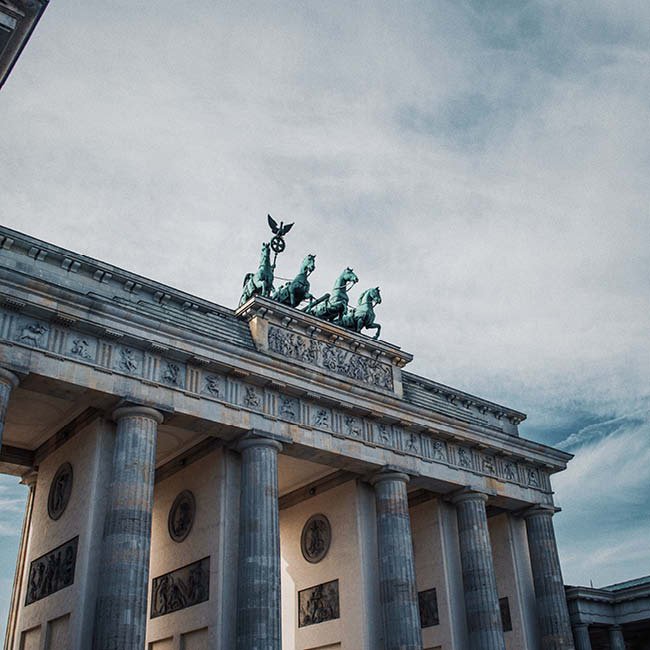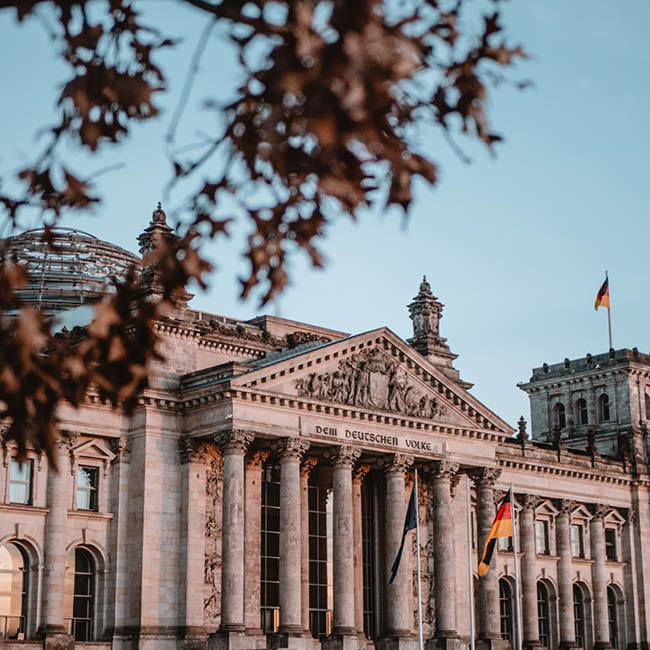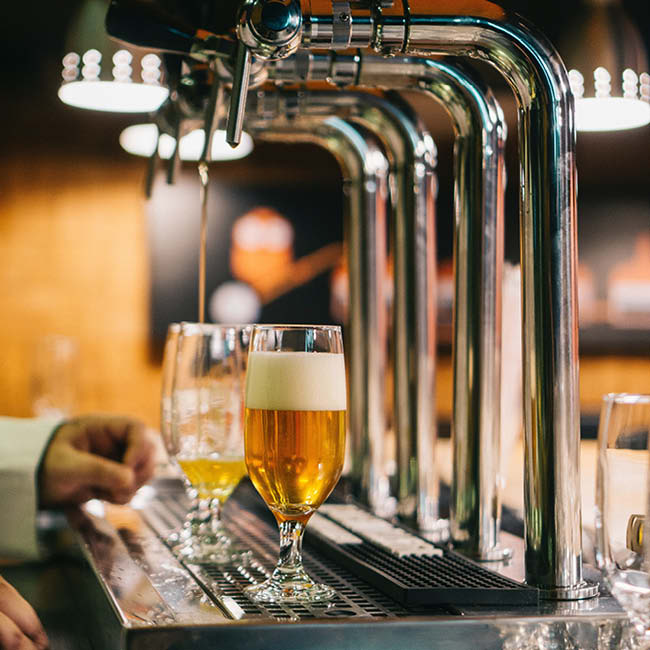
Germany is one of the largest countries in Europe with a rich and vibrant culture that’s made it well-known for a variety of reasons.
What’s the first thing that comes to mind when you think ‘What is Germany famous for?’ Is it beer and Oktoberfest, or sausages and Christmas markets?
In this article, we’ll be taking you through all of the most popular things that Germany is known for, as well as some of the other lesser-known things that attract flocks of visitors to the country every year.
If you’re planning to move to Germany as an international student, you may have done some research into the country already so we hope that you learn even more to make you feel extra knowledgeable.

The most famous city in Germany is our capital, Berlin. Not only is it the largest city in Germany, but it’s also the most popular, attracting over 135 million visitors a year - this makes it the third most-visited city in the European Union.
The city is also 9 times the size of Paris, and has more bridges than Venice!
Berlin is the central cultural hub of Germany which attracts a lot of young people and students. It also has a notorious nightclub scene that any international student would be interested in.
Other famous cities in Germany include Munich, which is known for being a charming city full of architecture and Frankfurt am Main, the economic hub of Germany.
The next famous city is Cologne, which is home to one of our CBS campuses. It’s one of the oldest cities in Germany and has a thriving student population that enjoys the range of architecture, museums, and culture in the city.
Explore our campus in Cologne and learn about the english-taugh study programmes.
We love food and beer in Germany so a lot of our events and festivals throughout the year are related to these 2 things.
Germany is known for our food-related festivals where we celebrate some of our nation’s favourite food, like Asparagusfest and Onionfest which are 2 of our staple crops. These harvest festivals happen in Schwetzingen every year.
The most famous event in Germany is the yearly Oktoberfest festival which attracts nearly 7 million people every year and sees almost 8 million liters of beer being consumed during the festival.
The festival lasts for 2 weeks in the Autumn and doesn’t just revolve around drinking beer, the festival grounds are also full of rides, games, food stands, and shops for everyone to enjoy.
For students coming to stay with us on campus in Cologne, you’ll be able to experience one of the biggest festivals in the country - Karneval (Carnival). In this two-week costume party, there are always events to attend and parades to watch, so it’s an event not to be missed.
Throughout the month of July, lots of different cities in Germany have pride celebrations. These celebrations involve parades, parties, and much more. The most popular festival is in Cologne, which is known as the gay capital of Germany.
If you’re in Germany around Christmas time, you cannot miss the opportunity of visiting some of the world-famous Christmas markets. Most major cities have their own Christmas market, but the most well-known ones are in Cologne, Aachen, Nuremberg, Munich, and Berlin.
Check out our undergraduate degrees
Check out our graduate degrees
German history really started in 843, when Germany emerged as a separate realm after the break-up of the Frankish empire.
Here are some more key historical dates that Germany is famous for:
1618-1648 - Thirty-Years' War
1806 - Napoleon's armies impose French rule over much of Germany
1848 - Year of Revolutions sees attempts to unite Germany under a democratic constitution
1890 - Founding of the Social Democratic Party of Germany.
1914-1918 - World War I
1919 - Treaty of Versailles
1939-1945 - World War II
1949 - Germany is divided into East and West Germany
1958 - Germany joins the EU
1989 - Germans from East and West tear down the Berlin Wall
2002 - Euro replaces Deutsche Mark.
In Germany, we are known for our cars so we’re sure you’ve heard of most of our biggest companies - like Volkswagen, BMW, and Mercedes Benz.
German cars are famous for their quality and technological innovation, our manufacturers are known as being some of the most valuable brands in the world. BMW, one of the leading brands is valued at over 23 billion U.S. dollars and the German car industry as a whole has a turnover of over 422.8 billion euros.
Some other popular German brands that you’ve probably heard of include Adidas, Lidl, Aldi, Nivea, Puma, and Fanta.
Germany is very famous for our food, but there are other products that you might be surprised to hear are from Germany.
Here are 10 surprising products that Germany is famous for:
Contact lenses
Christmas trees
Jeans
Bicycles
Record players and records
Mayonnaise
Accordion
Coffee filters
Gummy bears
Hole punch
Germans love socialising and being part of clubs, so it’s no surprise that sport is very popular - but there are 3 sports in particular that Germany’s most famous for.
The most popular sport in Germany, and the one that is most well-known, is football.
The German football league, Bundesliga, is one of the most successful European football leagues. The German football team has also won 4 World Cups (the second most successful nation, after Brazil), 3 European Championships, and 1 Confederations Cup.
The most famous German footballer, that you may have heard of, is Franz Beckenbauer. Not only is he a hugely successful player, but he has also managed one of the most successful German teams, Bayern Munich.
Germany is also known for its ice hockey, or eishockey, league, which may surprise you. The sport is known for having the loudest fans of any sport in the country. The German ice hockey league is known to be one of the best leagues worldwide, but still behind the American NHL league.
Golf is another famous German sport and is very popular among wealthy Germans. Golfing tournaments aren’t televised on free German TV, but the most successful German golfer at the moment is Martin Kaymer. He was once named the top golfer in the world in 2011 and has been the second youngest ever top-ranked golfer worldwide.

Food and drink are a very strong part of German culture, so if you come to visit you won’t be going hungry or thirsty!
The cuisine of Germany is made up of lots of regional delicacies, but most dishes will commonly contain meat, potatoes, and bread.
Bread is a huge part of German culture. Every region in the country has its own type of bread that’s made with different techniques and ingredients - typically lighter breads come from the south, and dark, heavy breads are baked in the north.
In total, there are over 300 different styles of bread in Germany!
Germany is also a country known for its love of beer, so if you enjoy this drink - Germany is the perfect place to be.
In fact, there are so many different types of German beer that you could drink a different beer every day and it would take 15 years to get through every single type.
The most popular German beer brand is Beck’s which is brewed in Bremen, brands like Krombacher and Warsteiner are also very popular.
Here are 10 more foods that Germany is famous for that you’ll have to try when you visit:
Currywurst
Döner Kebab
German pretzels
Rumkuchen
Wiener Schnitzel
Rouladen
Sauerbraten
Sauerkraut
Spargel
Reibekuchen
Check out our undergraduate degrees
Check out our graduate degrees
Germany is full of sweeping landscapes, beautiful architecture, and attractions for the whole family.
If you want to visit castles, Germany has some of the most beautiful. Some of the most popular include the royal Neuschwanstein castle in Füssen, which is visited by over 1.3 million people every year - it was even the inspiration for Disney’s Sleeping Beauty castle.
To get your fill of German castles, you can also visit Hohenzollern Castle in Bisingen, Wartburg Castle in Eisenach, and Heidelberg Palace. German castles are a mixture of Gothic ruins and more modern castles built for kings and queens and are mostly always available for tours.
Germany is also known for its impressive cathedrals that can be found in most major cities. The most famous cathedral being the Cologne Cathedral, right by our CBS campus, which is one of the largest cathedrals in the world and took over 600 years to complete. You can also visit cathedrals in Berlin, Aachen, Mainz and Magdeburg.
A lot of the most famous attractions that Germany is known for can be found in the capital city of Berlin. It’s home to the Brandenburg Gate, the city’s first Neoclassical structure, The Berlin Wall Memorial, and the Berlin Television Tower.
Berlin is also home to the famous Museumsinsel, or Museum Island, which is an island of the city’s oldest and most important museums; the Old Museum, New Museum, and National Gallery.
It would be hard to list all of the famous people that come from Germany as there are so many that have left their marks on the world.
Have you heard of any of these famous Germans?:
Albert Einstein
Ludwig van Beethoven
Karl Marx
Michael Shumacher
Johannes Kepler
J.S. Bach
Goethe
Sophie Scholl
Angela Merkel
Hugo Boss
In Germany, over 94,000 books are published every year which makes sense for a country that has such a rich literary culture. The modern printing press was invented in Germany, which meant that the first books and magazines were also made in Germany.
Most Germans read at least once a week, with some of the most famous German authors being Franz Kafka, Hermann Hesse, Thomas Mann, Erich Maria Remarque, and Johann Wolfgang von Goethe.
If you want to add some German books to your reading list, the books that German authors are known for include Death in Venice by Thomass Mann, All Quiet on the Western Front by Erich Maria Remarque, and Alone in Berlin by Hans Fallada.
Cologne is one of the major cities in Germany that is extremely well-known for being a hub of culture, architecture, and education.
It’s also where our main CBS campus is!
“Home is where the Dom is”. The Cathedral of St. Peter and St. Mary, is a masterpiece of High Gothic architecture, and a UNESCO World Heritage Site. The Cologne Cathedral dominates the city skyline like no other building and is one of the largest cathedrals in Europe. The Cologne Cathedral is not only a popular destination for tourists but also one of the most famous landmarks that Cologne is known for. The stairs leading down from the cathedral to the train station or the square on the opposite side – the so-called “Domplatte” – is a popular meeting place. So a visit to the Dom is an absolute must for everyone. If you want, you can also climb the 533 steps to the lookout platform and, from 97 meters up in the air, enjoy a unique panoramic view over all of Cologne.
Cologne is also known for being the gay capital of Germany and holds a big pride celebration every year - plus has hundreds of gay bars and clubs.
The people of Cologne are known for being very liberal and tolerant which has made it a very welcoming city for all types of people.
Similarly, CBS has always stood for diversity with regard to LGBTI+. In June 2021, we achieved third place out of 62 participating universities in the DACH region in uhlala's LGBTIQ+ audit. The basis for the ranking is a comprehensive audit consisting of five categories that rate universities according to their commitment to LGBTIQ+. This great result encourages us in the measures we have taken so far and spurs us on as a university to create an environment in which everyone is welcome.
Cologne is one of the media hubs of Germany, with ⅓ of TV programmes being produced here.
There are more than 70 publishing companies in the city and dozens of production companies, which attracts a lot of creative and artistic people.
Cologne celebrates Carnival the week before Lent and is known to be one of the craziest celebrations in Germany.
It’s a week-long event that sees locals dressing up in costumes, walking in parades - and drinking lots of Kölsch!
Kölsch is a type of beer that’s brewed in Cologne and very popular among locals, so expect to drink it a lot when you visit.
Kölsch is a light and refreshing beer that is very easy to drink and goes well with typical German foods like sausages and sauerkraut.
Learn more about living in Cologne as a student
Mainz was the birthplace of Johannes Gutenberg, who created the first movable printing press and printed many of his original books in the city.
There’s even a museum dedicated to Gutenberg in Mainz where you can explore the evolution of printed literature.
Explore our campus in Mainz and learn about our English-taugh study programmes
Mainz is famous for being a city that knows how to party, which is great for students at our Mainz CBS campus.
One of the most popular celebrations in Mainz is Fassenacht, where you can expect to party all day and all night in various locations across the city.
Mainz is known for being Germany’s wine capital as it’s in the center of the famous Rheinhessen region.
The 26,500 hectares of vineyards produce some of the most well-known German wines such as Riesling and Silvaner.
One of the most popular celebrations in Mainz is Fassenacht, a tradition that celebrates breaking the rules and making your own. During this festival, you can expect to party all day and all night in various locations across the city.
Learn more about living in Mainz as a student
Potsdam is known for its beautiful castles, the most well-known being Sanssouci Palace - some even call it the Versailles of Germany.
It’s an 18th Century palace that was commissioned by the Prussian King, Frederick the Great - the name of the castle is also French for ‘carefree’.
Not only is Potsdam home to one of our CBS campuses, but it’s also home to over 30 more research institutions and universities.
This includes the University of Potsdam, Fachhochschule, and the College of Film and Television.
Explore our campus in Potsdam and learn about our English-taugh study programmes
In 1990 many of the parks and palaces in Potsdam were awarded UNESCO World Heritage status - which means they are areas of outstanding universal value.
The site covers 500 hectares of land and includes 150 buildings.
Babelsberger Studio is the oldest large-scale studio in the world, and has been producing films since 1912 - it’s often known as German Hollywood!
Our CBS campus is also located within the film studio, so all of our students will be able to experience the history of the building first-hand.
Learn more about living in Potsdam as a student
As you have learned, there are plenty of typical German things that make Germany famous - from its rich culture and history to its modern universities and nightlife.
Here are some tips for living in Germany as an international student
By joining us on one of our study programmes at CBS, you’ll get the perfect opportunity to learn more about German culture and enjoy all of the things that we’ve covered in this article.
If you’d like to continue learning about Germany and studying at CBS, you can visit our undergraduate and postgraduate degree pages, or get in touch with one of our student advisors, or attend one of our info sessions.
Here you can find 98 interesting facts you probably did not know about Germany